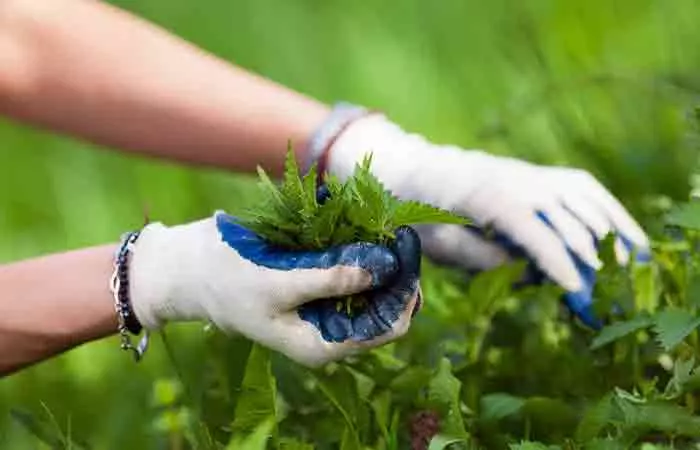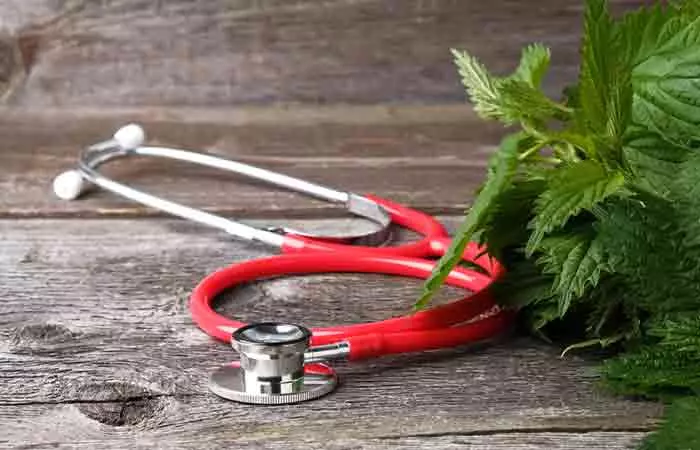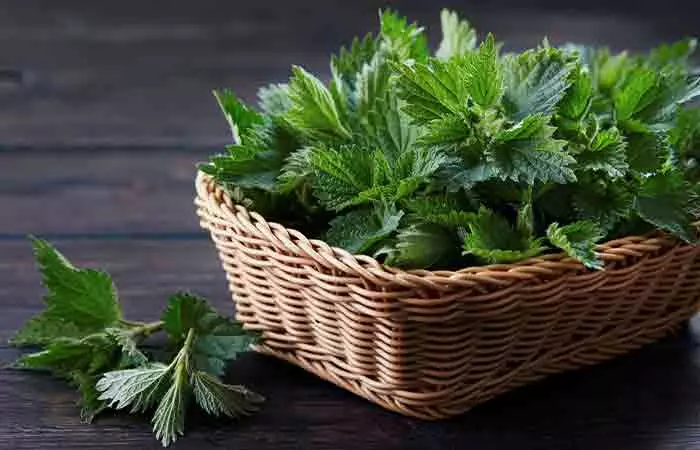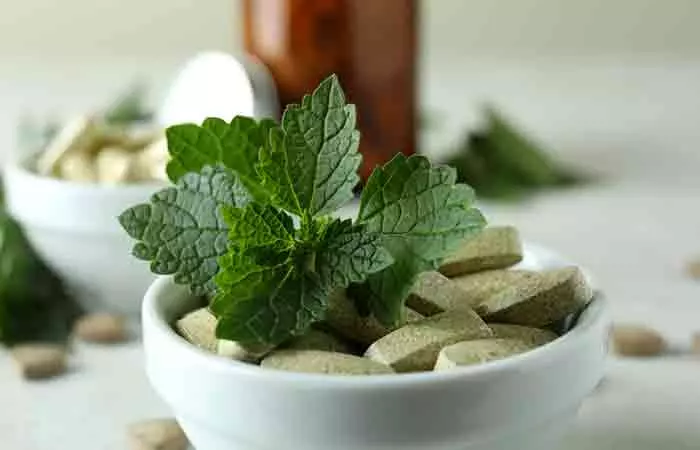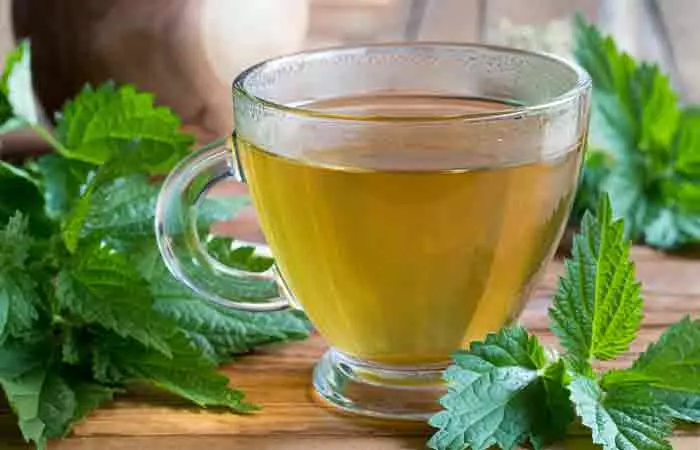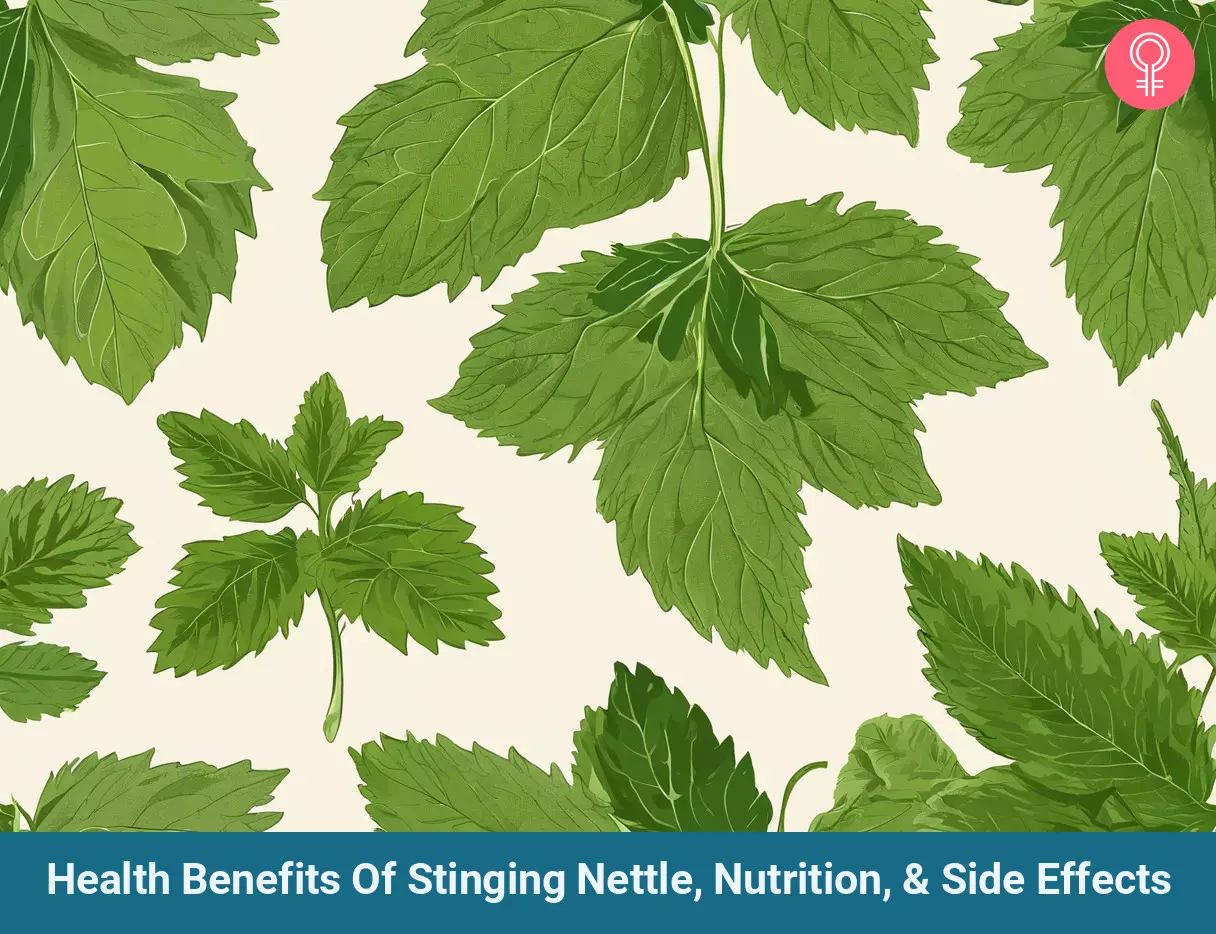The intake of stinging nettle in the form of a herbal beverage can help treat asthma and allergies, control blood sugar levels, enhance urinary tract health, and promote hair growth. This flowering plant has been used in traditional medicine for centuries. It contains nutritious compounds that can help you have a robust and healthy body. In this article, we have discussed the benefits, nutritional profile, and some possible side effects of stinging nettle and how to consume it. Keep reading!
What Is Stinging Nettle?
The stinging nettle (Urtica dioica) has been a staple herbal medicine since ancient times (2). It has an exotic biochemical profile. It grows in mild to temperate climates across the world – especially in places with plenty of moisture. You can find certain species of nettles often in forests, by the rivers or streams, and on roadsides. What Are Its Benefits? Stinging nettle helps to resolve prostate issues, manage diabetes and even relieve allergies and body pain. Who Can Consume It? Anyone looking to resolve their urinary and prostate gland issues can drink stinging nettle tea. How Often? You can drink 3 cups a day. Caution Avoid using if you are expecting or nursing because there is little data on its safety.
Its scientific name Urtica dioica comes from the Latin word uro, which means “to burn,” because its leaves can cause a temporary burning sensation upon contact. These plants (or weeds) are native to Mexico, Italy, Nepal, India, China, Russia, Netherlands, North America, and parts of Africa. Certain species of nettle, particularly the stinging nettle, have hairs on their leaves and aerial parts. Some of these sting too! Hence, the name (1). The leaves are densely covered with stinging hairs, which release potentially pain‐inducing toxins (1). When human skin comes in contact with a nettle leaf or stem, it rapidly develops reddish patches that itch and burn, ruining your healthy skin condition. The hairs or trichomes of the plant are naturally designed to protect the plant from insects. However, consuming this magical herb after processing is safe. The following section is all about the benefits of stinging nettle leaves. Start scrolling!
What Are The Health Benefits Of Stinging Nettle?
1. May Boost Hair Growth And Strength
It is believed that stinging nettle promotes hair health. Traditional medicine used Urtica species to stimulate hair growth. A study investigated this property of stinging nettle (Urtica dioica) with a combination of herbal extracts. This herbal preparation increased the proliferation of human dermal papilla cells (3). The β-sitosterol in stinging nettle triggers the formation of new blood vessels (angiogenesis). It encourages the synthesis of vascular endothelial growth factor (VEGF) and supports new hair growth (3). The leaves and roots of stinging nettles regulate the activity of the sex hormones and their substrates. They help control hair loss (alopecia) in men and women with hormonal imbalances (4).
2. May Treat Hay Fever, Asthma, And Allergies
Hay fever or allergic rhinitis is caused by pollen, dust mites, mold, fungus spores, cockroaches, and feathers. Other causes include food sensitivity, metabolic diseases, and certain drugs. Its symptoms include sneezing, nasal congestion, itching, lacrimation (constant tearing), headache, dry mouth, drowsiness, fatigue, and cardiac arrhythmia (5). This is where alternative medicine may come to the rescue (5), (6). Stinging nettle (Urtica dioica) contains nicotinamide, synephrine, and osthole, with potent anti-inflammatory and anti-allergenic properties. These phytochemicals exhibit an antagonist activity against the pro-inflammatory histamine receptors, blocking the production and release of histamine (5). They also interfere with the activity of pro-inflammatory cells, chemical messengers, and the controlling genes (5). According to a study, asthma is one of the most common respiratory illnesses in children. The study also stated that around 80% of asthma-related deaths occur in developing countries. Further, it highlighted that asthma prevalence is on the increase especially in the Eastern Mediterranean Region of the world. Health practitioners should look into the use of alternative medicine to treat acute and chronic disorders like asthma, respiratory tract allergies, etc. as an alternative to common medications (6).
3. May Help Manage Prostate Issues
Overgrowth of the prostate gland (benign prostatic hyperplasiai The first step in the progression of cancer where the organ or tissue expands due to a rise in cell growth. ) increases the pressure on the urethra. This disables the urinary system and causes several chronic disturbances with aging (7). In rat studies, stinging nettle showed improvement in prostate health. Nettle root extracts inhibit aromatase, an enzyme that converts testosterone into estrogen. Estrogen is closely linked to prostate disorders (7). Other studies demonstrate the antiproliferative properties of nettle root in human cancer cells. A 20% alcoholic extract of stinging nettle root reduced the growth of cancerous prostatic epithelial cells over a seven-day course (8).
4. May Reduce Inflammation
Stinging nettle extract contains an anti-inflammatory substance that can suppress several cytokines in inflammatory joint diseases (9). According to another study, applying stinging nettle leaf appears to provide osteoarthritic pain relief (10). Stinging nettle reduced levels of multiple inflammatory hormones by interfering with their production (11). However, more research and human studies are required to recommend nettle as an anti-inflammatory treatment.
5. May Lower Blood Pressure
Stinging nettle was traditionally used to treat high blood pressure (12). Stinging nettle extract was found to possess antihypertensivei A substance that lowers blood pressure levels by eliminating fluid and salt from the body or widening the blood vessels. effects. It may help lower blood pressure by allowing blood vessels to relax and reducing the force of the heart’s contractions. More human studies are needed to confirm these effects.
6. May Aid Blood Sugar Control
Nettle has shown some promising effects on blood glucose levels. Traditional medicine uses nettle leaves to treat diabetes mellitus due to their anti-hyperglycemici A substance that may lower blood glucose levels and inhibit the abnormal sugar accumulation in the blood. properties (13). However, more research on humans is needed to establish the safety and efficacy of nettle leaves in controlling blood sugar levels.
7. May Monitor Heart And Liver Health
In a 2018 rat study, the administration of 150 mg/kg/day stinging nettle extract for a month improved the blood lipid profile. The nettle extract worked far better than its commercial synthetic drug counterpart (14). Nettle extract boosts the antioxidant machinery in the body, thereby preventing (and ending) lipid peroxidation. A balanced lipid profile and healthy liver reduce the risk of hypercholesterolemiai A condition that causes elevated blood cholesterol levels. It restricts blood flow which raises the risk of cardiovascular disorders. -induced diseases (15). Hypercholesterolemia is linked to atherosclerosisi The gradual hardening and constriction of the arteries due to cholesterol and fat plaques clogging them. and other inflammatory diseases. Nettle leaf helps prevent atherosclerosis and hypertension, as per rat studies. It is, hence, a potent hepato- and cardioprotective dietary additive (16).
8. May Help Treat Menstrual Health, PCOS, And Fertility Concerns
Around 10%-15% of women of reproductive age experience oligomenorrhea and 3%-4% of them have amenorrhea. Oligomenorrhea and amenorrhea are changes in regular menstrual cycles that cause long menstrual cycles and the absence of menstruation, respectively. While hormone replacement therapy is the most common remedy, herbal medicine is proving to be effective in such cases (17). Herbal extracts of nettle, peppermint, onion, and nigella showed a positive effect on polycystic ovary syndrome (PCOS). They could control menstrual bleeding, ameliorate menstrual irregularities, balance hyperandrogenismi The state of and effects of high male sex hormone levels in women, particularly testosterone, androsterone, and androstenedione. , and promote fertility (17). These herbs possess phytochemicals, including flavonoids, phenols, phytosterols, and terpenoids, that can mimic the natural hormonal function and restrict bleeding. That is why nettle plant parts can enhance follicle maturation, reduce coagulation factors, relax uterine muscles, and facilitate uterine recovery (17), (18).
9. Can Accelerate Wound Healing
Wound healing could get prolonged in the presence of free radicals and several physiological stresses. The delay might affect one or all steps of wound contraction, recovery of epidermal cells (reepithelialization), and restoration of blood supply (neovascularization) (18). Using plant medicine for healing wounds is an ancient remedy. Several flowering plants like stinging nettle have been lauded for their vulnerary and antioxidant properties. The nettle leaf has an antihemorrhagici Also known as hemostatic, a drug or substance that may stop or reduce bleeding. effect because of its flavonoids, minerals, vitamins, and fatty acid content (18). Using stinging nettle extract on wounds would reduce the bleeding time and promote blood clotting. It also eliminates pathogens, traps the pro-inflammatory free radicals, and reduces the average healing time in rat models (18).
10. May Help Manage Eczema
Nettle has been traditionally used to manage skin conditions like eczema. Its anti-inflammatory properties may help reduce the itching, redness, and swelling associated with the condition (19), (20), (21). Stinging nettle is also rich in vitamins, minerals, and antioxidants that may help nourish the skin and boost one’s overall health (22). However, more studies are warranted to further understand the role of stinging nettle in managing eczema. Also, do note that individual responses to nettle may vary. Hence, consult a healthcare professional and perform a patch test before incorporating nettle into your routine. Discontinue use if you experience any adverse effects. In short, the leaf, root, and other parts of the stinging nettle have powerful antioxidant, vulnerary, antihemorrhagic, anti-inflammatory, anti-atherosclerotic, anti-hypercholesterolemic, cardioprotective, hepatoprotectivei The capacity of a substance to protect the liver from damage and help it heal from injury caused by toxins. , anti-allergic, and anti-diuretic properties. Absolutely! Learn more about them in the following section.
Nutritional Profile Of Stinging Nettles
The stinging nettle plant contains a load of phytochemicals. The fresh leaves contain β-carotene, violaxanthin, xanthophylls, zeaxanthin, luteoxanthin, and lutein epoxide that impart those mind-blowing benefits to this herb. Nettle also contains phenolic acids, including carbonic, caffeic, caffeoyl malic, chlorogenic, formic, silicic, citric, fumaric, glyceric, malic, ellagic, oxalic, phosphoric, and succinic acids (23). Quercetin, myricetin, isorhamnetin, kaempferol, etc. are the flavonoids. Acetylcholine, betaine, choline, lecithin, histamine, scololeptin, rutin, rosinidin, and naringin are a few other phytochemicals present in the nettle leaf, root, and stalk (23). This medicinal herb scores well in nutrition too. The leaves contain copious amounts of potassium, calcium, folate, vitamins A and K, simple carbohydrates, protein, and essential precursors. Source: USDA
How To Consume It
Nettle leaves are very versatile and can be brewed as an herbal tea, taken as a supplement, and applied as an ointment. You can buy dried/freeze-dried leaves, capsules, tinctures, and creams. Stinging nettle ointments are often used to ease osteoarthritis symptoms. Studies suggest that the following doses are most effective for certain conditions (24):
Allergies: 600 mg of freeze-dried leaves per day Enlarged prostate gland: 360 mg of root extract per day
It is available in many stores. The dried leaves and flowers can be steeped to make an herbal tea, while its leaves, roots, and stems can be cooked and added to soups, smoothies, and stews. Agnes Plume, a blogger, tried stinging nettle tea and shared her experience in a blog post: “I first drank nettle tea in a little cortija in the Alpujarras. It was a monumental moment as I felt the transformation of the water move into a thick broth in my throat. Minutes later I felt a fullness percolate through me that pulled me down, rooted. I was acutely aware my feet were on the ground and felt as if I had a firm and protective barrier around me (i)”. Blanched nettles can be a good addition to your salad. Try tossing a few nettle leaves into your salad. If that doesn’t sound appealing, you can brew a cup of fresh tea with nettle.
How To Make Stinging Nettle Tea
What You Need
Fresh or dried nettle leaves – 1 loose cup (about 250ml) Water – 1-2 cups Boiling pot or kettle
Let’s Make It! You might find it tasting bitter and woody initially. A few cups or days down, you will come to love its freshness. Alternatively, blanch the nettle greens in saltwater and use them in salads or pesto. You could also sauté the greens in oil, butter, or other cooking fat. This can be enjoyed with red or white meat and added to salads. Ingesting nettle greens is a popular and more effective way of obtaining their benefits. But they are wild plants and called ‘stinging’ nettles. Should you be concerned? Absolutely! Check out the adverse effects of using nettle leaves.
What Are The Side Effects Of Stinging Nettle?
Well, contrary to their wildness, nettles are considered safe. There are very few side effects of having them, but none are lethal or toxic (25). Hair-like barbs of nettle leaves can harm the skin. These barbs can inject a variety of chemicals, such as (23):
Acetylcholine Histamine Serotonin Moroidin Formic acid
These compounds can cause burning and rashes. Researchers found that nettle roots might cause GI tract disturbances, profuse sweating, and allergies in some individuals. Freshly plucked nettle leaves might cause localized stinging, rash, itching, and tongue edema (25). But as they act as an emmenagogue, they may possess uterine-stimulant properties. If pregnant women take nettles without medical supervision, they could go into premature labor. Cooked and dried stinging nettle is safe to consume. However, eating fresh leaves may cause irritation. Does nettle tea help you sleep? Check out the infographic to learn the steps.Illustration: StyleCraze Design Team Yes. Nettle tea promotes better sleep without increasing blood sugar levels, which makes sleep deeper. How much nettle tea should you drink a day? The maximum recommended use of nettle tea is four cups per day. Does nettle tea contain silica? Yes, nettle leaves contain silica (26). Is stinging nettle good for the kidneys? Yes. The stinging nettle can have therapeutic effects toward urinary tract infections and kidney stones. The flavonoids, anthocyanins, and saponins present in stinging nettle can help inhibit calcium and oxalate deposition (27). Does stinging nettle interact with medications? Yes. Using herbal medicines like nettle leaves with anti-inflammatory drugs is not recommended as they may interact with synthetic drugs. Do not take these leaves when you are on painkillers or similar medications without consulting your doctor. What is the difference between nettle and stinging nettle? Both refer to the same plant. It is also referred to as burn nettle or the common nettle. Does stinging nettle have caffeine? No, stinging nettle does not contain caffeine. It is rich in vitamin A, vitamin C, iron, calcium and sodium while also being a good source of phenylpropanoids and caffeic acid (1). Does stinging nettle boost the immune system? Yes. Stinging nettle is rich in antioxidants like phenolic acids and flavonoids. These antioxidants can boost the immune system (28).
Illustration: Health Benefits Of Stinging Nettle Nutrition & Side Effects
